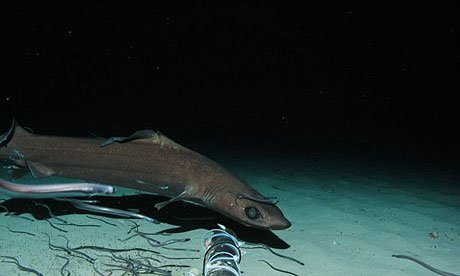In a development welcomed by marine conservationists yesterday, L'Oreal said it had started switching to plant sources for the compound squalene, which is used in creams, lotions and glosses.
Unilever said it had stopped using shark oil in high street brands such as Pond's and Dove some years ago and was now ensuring that beauty spas the firm owns in Spain did likewise. Boots and Clarins have either made similar decisions or never used shark sources in the first place, according to information gathered by the campaign group Oceana. Boots told the Guardian it had never sold shark squalene.
Oceana wants consumers to ask cosmetic retailers about squalene sources and only buy products free of shark oil, while encouraging manufacturers using plant alternatives such as olive oil to make that clear on their products. The group is campaigning for a total ban on deep-sea shark fishing in the north-east Atlantic, which it said has contributed to dramatic declines in shark numbers.
L'Oreal said it had made its decision in 2006, as soon as it was sure that it could get sufficient plant-based supplies.
The firm was unable to say which products used to contain shark squalene, but confirmed that the substitution plan had been completed in all skincare products. Only 12 make-up formulas, including 8 lipsticks under the Shu Uemura brand name, remain unaltered. "We hope to finalise this substitution programme for these remaining formulas in 2008," said Pierre Simoncelli, the director of sustainable development, in a letter to Oceana.
But a European directive meant L'Oreal could not differentiate between sources on its product labels - making it "difficult to communicate on the packages of our products on this substitution".
Unilever said its move "is part and parcel of becoming as responsible as one can in our supply chain".
Rebecca Greenberg, a marine scientist with Oceana and coordinator of its shark campaign, said the group was satisfied that real progress had been made. "Some of the biggest names in the cosmetics industry are recognising their corporate social responsibilities and choosing not to contribute to the extinction of these important animals," she said.
Oceana said the market for squalene in cosmetics had driven fishing for sharks including gulper, kitefin and Portuguese dogfish, all of which live at depths between 1,300m and 1,500m. But international limits on deep-sea shark fishing by European fleets in late 2005 had made it far more expensive than alternatives.
The livers of such sharks can make up to a third of the animals' weight. Oceana said the world market is between 1,000 and 2,000 tonnes and squalene traders had turned their attention to Asia. Some components from liver oil are also used in alternative medicines for healing wounds and reducing pain. Shark's fin is used in soups, and its skin for sandpaper or for leather in luxury items such as handbags. Cartilage from tropical and deep-sea sharks is used in dietary supplements and an alternative treatment for osteoarthritis.
Deep-sea sharks are particularly vulnerable to overfishing as they are slow-growing, long-living and produce few young. Oceana said that over a third of European shark and related ray populations are threatened with extinction.
Animal products in cosmetics
Ambergris From whale intestines. Used as a fixative in perfumes and as a flavouring in foods and beverages
Keratin Protein from the horns, hooves, feathers, quills, and hair of various animals. In hair rinses, shampoos, permanent wave solutions
Castor Creamy substance with strong odour from muskrat and beaver genitals. Used as a fixative in perfume and incense
Cochineal Red pigment from crushed female cochineal insect. Reportedly, 70,000 beetles are killed to produce one pound of this red dye. Used in cosmetics and shampoos
Spermaceti Waxy oil derived from the sperm whale's head or from dolphins. In skin creams, ointments, shampoos, candles
Turtle oil From the muscles and genitals of giant sea turtles. In soap, skin creams, nail creams
· Source: Peta











